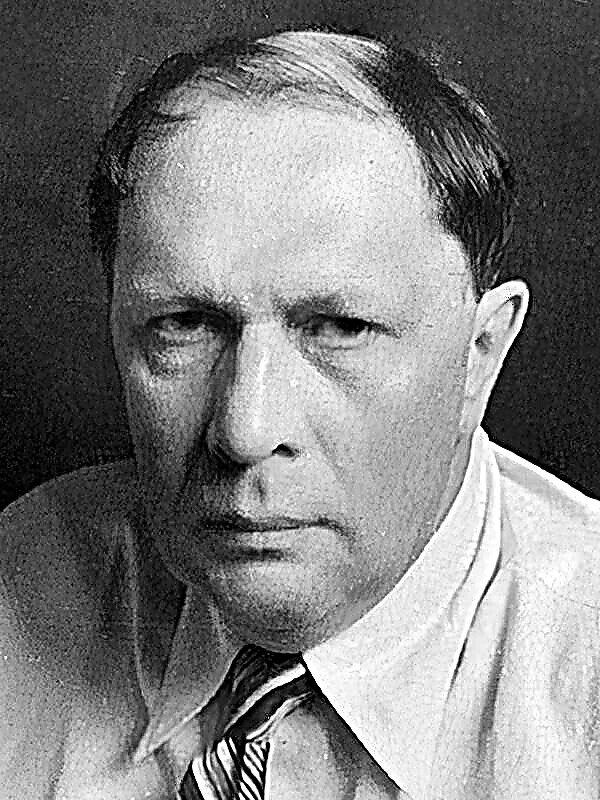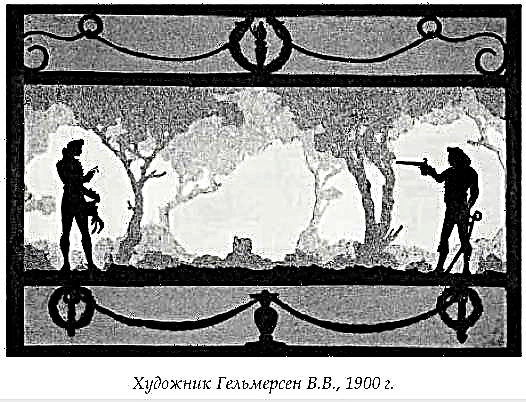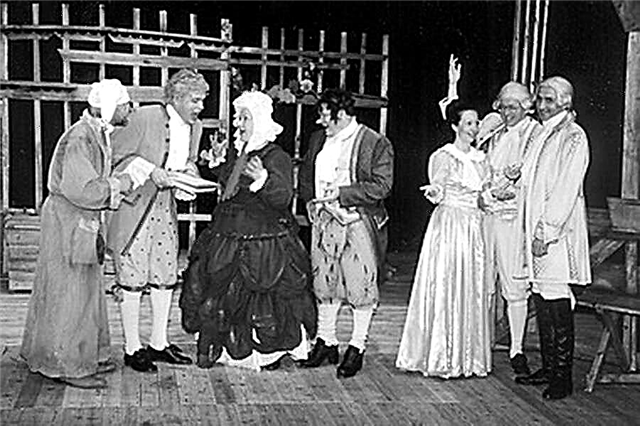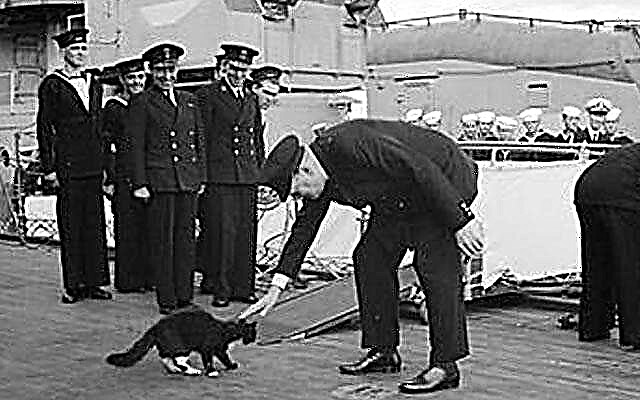“Childhood” is one of the first works of Leo Tolstoy, with which he began his long career. This story has an autobiographical character.
History of creation
Lev Nikolaevich was always interested in the life and soul of a simple Russian person, and in 1851, being in the Caucasus with his brother, Tolstoy thoroughly took up writing the novel “Childhood” - the first part of the trilogy, which was supposed to show all stages of personality development and formation. Many stories and facts from the book are taken from the life of the author himself. He, too, was equal in everything with his brother, early lost his mother and was looking for himself from birth.
Work on the work went on for more than a year, and soon the story saw the light on the pages of the journal Sovremennik. To understand the book and its creator, you must first turn to its biography. Tolstoy’s childhood story is described in detail in his biographies.
Genre and direction
The genre of the book is an autobiographical novel. The direction is realism, because all the main events are based on facts from the life of the writer. All that is described in the work shows the life and customs of Russian nobles of the 19th century.
The story is part of the trilogy, as you know, after "Childhood" followed by "Adolescence" and "Youth" Nikolenka.
Essence
The story is based on events from the life of Nikolenka Irteniev, the main character. The narration is conducted on behalf of Kolya himself, the boy talks about life in a noble house, hunting, a teacher, first love, personal experiences and hard times. We see the world through the eyes of a 10-year-old boy who is just beginning to understand the essence of things, feelings and human behavior.
Nicholas is faced with a variety of phenomena. His mother dies, and he is forced to leave the house and go to study in a large and alien city. There he begins a new life, full of adventure, discovery and reflection. The plot of the book we described briefly and accurately in chapter summary.
Main characters
The image and characteristics of each character are in this article. Here we provide only the most basic information about the life and character of the hero.
- Nikolenka Irteniev - The main character, a boy from a noble family. He very subtly feels the world, is smart beyond his years, but the learning process itself is boring for him. Nikolenka tries to find the essence, meaning in everything, but often makes mistakes due to heightened sensitivity and temper. He is kind, but he knows: it is easy to lead him astray, because he often imitates older or stronger peers.
- Mum - in the story itself, the author does not show the woman’s character directly, but we can trace her influence on her son. Thanks to the kind mother’s heart, the boy became so sensitive and compassionate.
- Dad - a reasonable and strict man. The hero loves him no less, the father retains authority before his son in any situation.
- Natalya Savishna - The housekeeper, the former nanny of the mother of Nikolenka. By nature, a very altruistic woman, she is ready to give all of herself for the sake of the family she serves.
- Karl Ivanovich - teacher Nikolenka, a very kind and caring person who wants only the best for the boy.
Topics
- The main theme of the story is the formation of personality. A person acquires individuality, starting from childhood. Events at an early age subsequently affect the fate of people, determine it in many ways. Tolstoy shows the dialectic of the hero’s soul - the process of its development. Each line, each gesture has an explanation, and it is necessary to look for it precisely in childhood.
- Another important topic - education. The hero is surrounded by care and attention from a young age, he feels necessary. Therefore, good qualities often prevent him from doing wrong. This is not the merit of genetics, he is simply well-brought up, and, adopting manners in an urban environment, he gradually becomes more reasonable and far-sighted.
- Mother's love - also a central theme in the story. It was the mother who taught the sons to subtly feel the world around them, rewarded the children with a heightened sense of justice and sympathy. Receiving the affection and warmth of maternal participation, they themselves became merciful, attentive and not indifferent people who were able to admit mistakes and make amends.
- Family theme - also a very important aspect. Relations between relatives largely determine the future of children. Seeing a prosperous home and prosperity, they strive to build their lives in the image and likeness of their relatives.
- Teacher role. Tolstoy understands the importance of the teacher for the pupil. Karl Ivanovich does not dissolve the students, shows firmness, but at the same time he is sincerely disposed towards them. The old man loves and respects children, not allowing himself to be rude to them.
Issue
In this story, Tolstoy touches on many problems that are relevant to this day. We list only the main ones.
- Loss of a loved one. Children are especially close to heart taking losses. Especially in the family. The writer showed how his sons yearn for his mother, how painful it is for them to lose her. They simply do not know how to live on. This problem does not have a universal solution, but relatives should do everything possible so that children do not feel orphans. This is the only way out, and Tolstoy shows how to behave in such a situation.
- Evil influence. The child is very susceptible to outside influences. It is easy to lead him astray, especially if he was brought up gently, without any particular demands. Nikolai succumbed to harmful moods and began to behave badly towards another boy, obeying herd feelings. He imitated Seryozha Ivin and wanted to please him. Unfortunately, adults do not always notice the source of bad influence in time, and this connivance can lead to the fact that proper education will not bear fruit.
- Adult negligence. Parents themselves often make mistakes in education. For example, Tolstoy showed this at a reception with his grandmother, where relatives of little Nikolenka pressed heavily. Grandmother publicly assured people that her grandson was caring for a little guest, he was very embarrassed and lost confidence. The impressionability of the child must be taken into account and not frighten him with his exposures, especially when with outsiders.
- The problem of choosing a life path. The hero rushes between good and evil, between callings, between girls that he likes. He has not yet decided what he is.
The main idea
In his work, Tolstoy wanted to show the influence of the world and people on the formation of personality. How each event is built into a clear picture and is reflected in the formation of human consciousness. Each seemingly insignificant episode can become a motive for a fateful act in the future. Such is the idea of the story from which morality can be drawn: nothing can be neglected in the education of the younger generation. Everything that is done with the child is very important, because the basics of the human worldview are formed from childhood.
The meaning of the story is that the role of the family in society cannot be overestimated. In this social institution, a person acquires moral guidelines, there he finds himself. And what it will be like depends, first of all, on its parents, relatives, who must choose the right and healthy environment for the younger generation.
Conclusion: what does it teach?
This story teaches you to value your family, your home and be more attentive to everything that surrounds us. Being close to the people we love, learning from mistakes to make the lives of our loved ones better every day.
The author also teaches the reader responsibility. Having a baby is a very important and crucial step that the whole family takes, and not just mom. Every relative, every family friend should take part in raising children, be attentive to their needs, because this is our common future.
Children themselves must learn moral lessons: to love and respect relatives, think with their own heads, and not repeat other people's mistakes. You need to value yourself without humiliating yourself in front of other children and not trying to win their friendship if they themselves are arrogant towards you. Also, the child must learn to objectively evaluate the world around and people, not allowing the first and wrong impressions to overshadow the arguments of the mind.

 Golden Key
Golden Key









